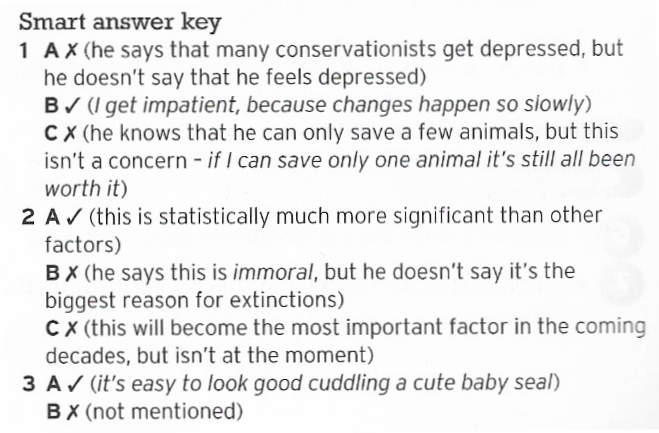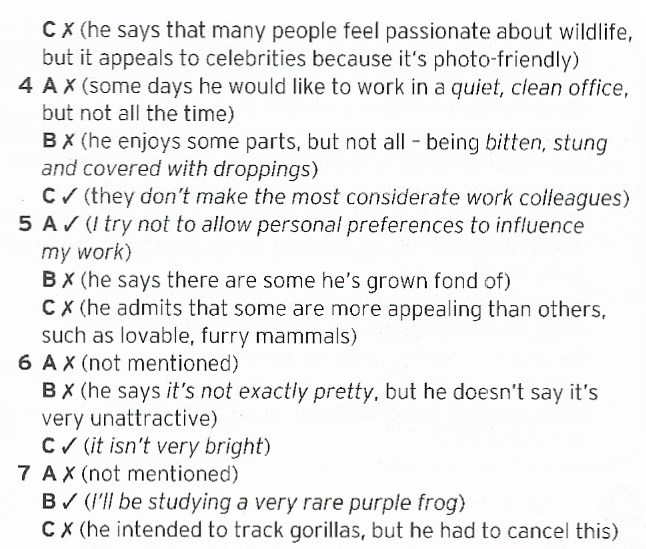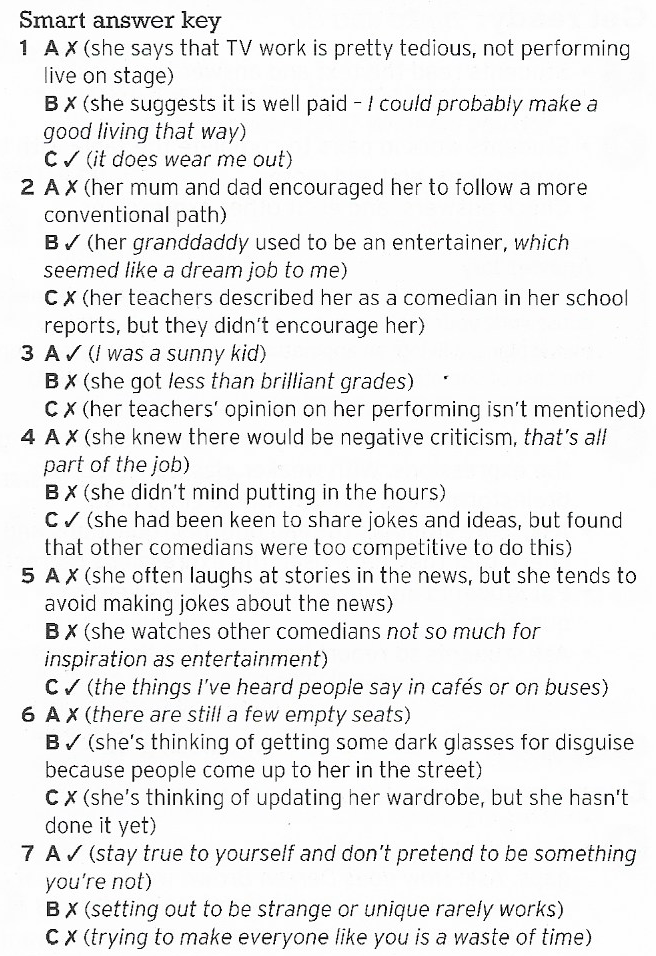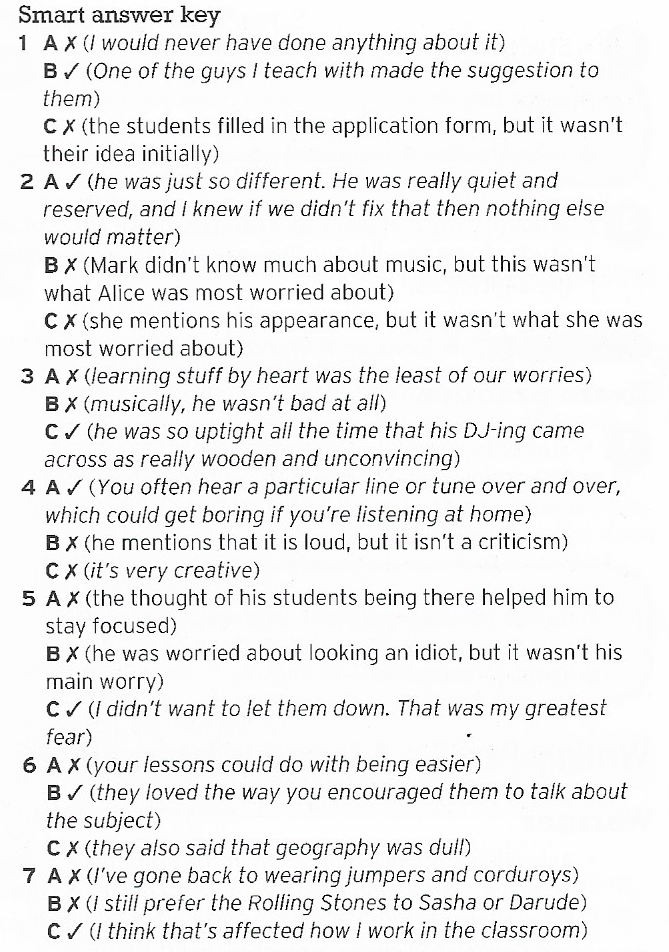-
FCE- Introduction
-
First (FCE) Exam: General OverviewLecture1.1
-
Computer Based Exam TutorialLecture1.2
-
The Cambridge English Scale: ResultsLecture1.3
-
FCE Score: How to calculateLecture1.4
-
Preparing for the exam: What should you know?Lecture1.5
-
-
Paper 1- Reading and Use of English
-
Introduction to the Reading and Use of English section of the FCE examLecture2.1
-
Developing reading skills: skimming, scanning, and reading for detailLecture2.2
-
General Information and Tips- Reading and Use of English- Paper 1Lecture2.3
-
Tips: Part 7- Multiple Matching- Reading and Use of EnglishLecture2.4
-
Practice Part 7-Multiple Matching- Reading and Use of EnglishLecture2.5
-
Tips Part 4-Key Word Transformation- Reading and Use of EnglishLecture2.6
-
More Tips Part 4- Key Word Transformation- Reading and Use of EnglishLecture2.7
-
Practice Part 4- Key Word Transformations- Reading and Use of EnglishLecture2.8
-
Tips Part 6- Gapped Text- Reading and Use of EnglishLecture2.9
-
Practice Part 6- Gapped Text- Reading and Use of EnglishLecture2.10
-
Tips Part 3-Word Formation- Reading and Use of EnglishLecture2.11
-
Practice Part 3- Word Formation-Reading and Use of EnglishLecture2.12
-
Tips Part 5- Multiple Choice- Reading and Use of EnglishLecture2.13
-
Practice Part 5- Multiple Choice- Reading and Use of English-Lecture2.14
-
Tips Part 1- Multiple Choice Cloze- Reading and Use of EnglishLecture2.15
-
More Tips Part 1- Multiple Choice Cloze- Reading and Use of EnglishLecture2.16
-
Practice Part 1- Multiple Choice Cloze- Reading and Use of English-Lecture2.17
-
Tips Part 2- Open Cloze- Reading and Use of EnglishLecture2.18
-
More Tips Part 2- Open Cloze- Reading and Use of EnglishLecture2.19
-
Practice Part 2- Open Cloze- Reading and Use of EnglishLecture2.20
-
General Overview and Tips- Reading and Use of EnglishLecture2.21
-
General Review- Reading and Use of EnglishLecture2.22
-
Paper 1 Practice- Reading and Use of EnglishLecture2.23
-
More Tips and Practice- Part 1- Multiple Choice Cloze-Reading and Use of EnglishLecture2.24
-
More Practice- Part 1- Multiple Choice Cloze- Reading and Use of EnglishLecture2.25
-
More Practice- Part 1- Multiple Choice Cloze- Reading and Use of EnglishLecture2.26
-
More Practice- Part 1- Multiple Choice Cloze- Reading and Use of EnglishLecture2.27
-
More Tips and Practice- Part 2- Open Cloze- Reading and Use of EnglishLecture2.28
-
More Tips and Practice- Part 3- Word Formation- Reading and Use of EnglishLecture2.29
-
More Tips and Practice- Part 4-Key Word Transformation-Reading and Use of EnglishLecture2.30
-
More Practice- Part 4- Key Word Transformation- Reading and Use of EnglishLecture2.31
-
More Practice- Part 4- Key Word Transformation- Reading and Use of EnglishLecture2.32
-
More Practice- Part 4- Key Word Transformation- Reading and Use of EnglishLecture2.33
-
More Tips and Practice- Part 5- Multiple Choice- Reading and Use of EnglishLecture2.34
-
More Practice- Part 5- Multiple Choice- Reading and Use of EnglishLecture2.35
-
More Tips and Practice- Part 6- Gapped Text- Reading and Use of EnglishLecture2.36
-
More Practice- Part 6- Gapped Text- Reading and Use of EnglishLecture2.37
-
More Tips and Practice- Part 7- Multiple Matching- Reading and Use of EnglishLecture2.38
-
Protegido: Sample Paper Test- Reading and Use of English 01 hour 15 minLecture2.39
-
-
Grammar
-
Dynamic vs Stative Verbs- MN Video- Listening- Grammar FocusLecture3.1
-
Dynamic vs Stative Verbs – Quiz – Practice Focus 10 questionsQuiz3.1
-
Verb + Gerund- Reading and Writing- Grammar FocusLecture3.2
-
Verb + Infinitive- Reading and Writing- Grammar FocusLecture3.3
-
Verb + Gerund/Infinitive- Reading and Writing- Grammar FocusLecture3.4
-
Verb + Gerund/Infinitive- Reading and Writing- Grammar FocusLecture3.5
-
The Use of Articles (a/an/the)- Reading and Writing- Grammar FocusLecture3.6
-
-
Vocabulary
-
Vocabulary development and strategies for word formation and collocationsLecture4.1
-
Vocabulary- Learning TipsLecture4.2
-
Collocations- Part 1Lecture4.3
-
Collocations- Part 2Lecture4.4
-
Collocations- Part 3Lecture4.5
-
Collocations- Part 4Lecture4.6
-
Collocations- Part 5Lecture4.7
-
Prefixes and Suffixes- Part 1Lecture4.8
-
Word Formation -“-ed” vs “-ing”Lecture4.9
-
Phrasal Verbs (1): meanings and typesLecture4.10
-
Phrasal Verbs (2): SeparabilityLecture4.11
-
-
Paper 2- Writing
-
Writing- Preparing for the examLecture5.1
-
Writing- Some Common QuestionsLecture5.2
-
Writing- Dos and Don’tsLecture5.3
-
Writing- How is FCE Writing Scored?Lecture5.4
-
Informal Letter/Email- Writing GuideLecture5.5
-
Informal Email/Letter- Sample and TipsLecture5.6
-
Informal Letter or Email-Tips/Sample questions and answersLecture5.7
-
Informal Email/Letter- Sample and PracticeLecture5.8
-
Formal Email/Letter – Steps to WritingLecture5.9
-
Letter of Application- Writing GuideLecture5.10
-
Letter of Application- Understanding and ModelLecture5.11
-
Letter of Application- Sample and PracticeLecture5.12
-
Letter of Application-Writing Topics- PracticeLecture5.13
-
Formal and Semi-formal Letter/ Email- Tips and SamplesLecture5.14
-
Email/Letter General Writing GuideLecture5.15
-
Article- Steps to WritingLecture5.16
-
Article- Writing Guide,Tips and Sample Questions and AnswersLecture5.17
-
Article- How to Write an Article- VideoLecture5.18
-
Article- Writing Topics- PracticeLecture5.19
-
Essay- Writing GuideLecture5.20
-
Writing Essays for the FCE- Types and OrganizationLecture5.21
-
Essay- Writing Guide, Tips and Sample Questions and AnswersLecture5.22
-
Essay- Tips and SamplesLecture5.23
-
Essay- Samples,Tips, and PracticeLecture5.24
-
Review- Writing Guide, Tips, and Sample Questions and AnswersLecture5.25
-
Review- Steps to Writing and TipsLecture5.26
-
Review- Tips and SampleLecture5.27
-
Review- Tips and SampleLecture5.28
-
Review- Sample Questions- PracticeLecture5.29
-
Report- First Steps to Writing a ReportLecture5.30
-
Report- Writing GuideLecture5.31
-
Report- Writing Sample Questions-PracticeLecture5.32
-
Writing-10 B2 First Writing Exam TipsLecture5.33
-
Writing- B2 First Writing ChecklistLecture5.34
-
Protegido: Writing- B2 First Writing Sample Paper Test Parts 1 and 2 01 hour 20 minLecture5.35
-
Writing Essays- 5 most common mistakesLecture5.36
-
-
Paper 3- Listening
-
FCE Listening- Introduction and General TipsLecture6.1
-
FCE Listening- Do’s and Dont’sLecture6.2
-
FCE Listening Tips- Part 1- Multiple ChoiceLecture6.3
-
Listening Practice- Part 1- Multiple ChoiceLecture6.4
-
Listening Practice- Part 1- Multiple ChoiceLecture6.5
-
Listening Practice- Part 1- Multiple ChoiceLecture6.6
-
FCE Listening Tips- Part 2- Sentence CompletionLecture6.7
-
Listening Practice- Part 2- Sentence CompletionLecture6.8
-
Listening Practice- Part 2- Sentence CompletionLecture6.9
-
Listening Practice- Part 2- Sentence CompletionLecture6.10
-
FCE Listening Tips- Part 3- Multiple MatchingLecture6.11
-
Listening Practice- Part 3- Multiple MatchingLecture6.12
-
Listening Practice- Part 3- Multiple MatchingLecture6.13
-
Listening Practice- Part 3- Multiple MatchingLecture6.14
-
Listening Practice- Part 3- Multiple MatchingLecture6.15
-
FCE Listening Tips- Part 4- Multiple ChoiceLecture6.16
-
Listening Practice- Part 4- Multiple ChoiceLecture6.17
-
Listening Practice- Part 4- Multiple ChoiceLecture6.18
-
Listening Practice- Part 4- Multiple ChoiceLecture6.19
-
Protegido: Listening- Sample Paper Test 1Lecture6.20
-
Protegido: Listening- Sample Paper Test 2Lecture6.21
-
-
Paper 4- Speaking
-
Varieties of EnglishLecture7.1
-
Speaking- Preparing for the examLecture7.2
-
Speaking- Some More TipsLecture7.3
-
Speaking- Some Common QuestionsLecture7.4
-
Speaking- Do’s and Don’tsLecture7.5
-
Speaking- Examiners CommentsLecture7.6
-
Speaking- Exam AssessmentLecture7.7
-
Speaking Part 2- Exam Tips and PracticeLecture7.8
-
Speaking Part 2- PracticeLecture7.9
-
Speaking Part 2- PracticeLecture7.10
-
Speaking Part 3- Exam Tips and PracticeLecture7.11
-
Speaking Parts 3 and 4-Exam Tips and PracticeLecture7.12
-
Speaking Part 1- Exam Tips and PracticeLecture7.13
-
Speaking Part 1- PracticeLecture7.14
-
Speaking Part 1- PracticeLecture7.15
-
Speaking Exam ReviewLecture7.16
-
Speaking Test PracticeLecture7.17
-
-
Topic Related Activities
Listening Practice- Part 4- Multiple Choice
Exam Tips
Listening to a long text
It can be difficult to listen to a long text, but to make it easier you can …
- read the rubric and the questions carefully before you listen and underline any key words.
- listen and underline the best options. Don’t waste time writing long notes.
- don’t panic if you can’t answer a question immediately. Keep listening and move on to the next question.
- when you’ve heard the recording twice, choose an answer for every question, even if you still aren’t sure.
- In part 4, you need to listen for opinions and atitudes, not just facts.Opinion expressions such as I think and observation expressions such as seems like can give you clues. Emphasis or the way something is described can review a speaker’s opinion
- listen for synomyms and paraphrases
PRACTICE 1
Source: Target FCE Unit 4 pg 46
You will hear an interview with a conservationist, Eddie Scherbaum, who talks about his work with animals. For questions 1-7, choose the best answer ( A, B or C).
1 What concern does Eddie have about conservation?
A He thinks it is a depressing filed to work in.
B He wishes progress would happen more quickly.
C He fells bad because he can onlt save a few animals.
2 What does Eddie think is currently the biggest reason for animal extinctions?
A loss of habitat
B illegal hunting
C climate change
3 What does Eddie say about famous people?
A They recognise that animals are good for their image.
B They should do more to help environmental issues.
C Many of them are genuinely interested in conservation.
4 How does Eddie feel about working with animals?
A He would prefer to work indoors.
B He enjoys every moment he is at work.
C He admits they can be difficult to work with.
5 Why doesn’t Eddie have a favourite animal?
A He does not wish to be unfair in any way.
B He does not seel fond of any particular species.
C He believes that all of them are equally appealing.
6 What does Eddie think of the waldrapp ibis?
A It isn’t very likeable.
B It’s really unattractive.
C It lacks intelligence.
7 Which kind of animal is Eddie going to work with for his next project?
A a worm
B a frog
C a gorilla
PRACTICE 2
Source: Target FCE Unit 8 pg 94
You will hear an interview with Zadie Mack, a comedian who has just toured America. For questions 1-7, choose the best answer ( A, B or C).
1 What does Zadie say about performing live on stage?
A It’s something boring.
B It isn’t well-paid.
C It can be very tiring.
2 Why did Zadie decide to follow a career in comedy?
A Her parents encouraged her.
B Her grandfather inspired her.
C Her teachers suggested the idea.
3 Zadie got on well with her teachers because they thought she was
A a good-natured girl.
B an intelligent student.
C a talented performer.
4 For Zadie, what was the most difficult part of getting started in comedy?
A learning how to cope with criticism
B working for extremely long hours
C having to develop her act by herself
5 What is Zadie’s best source of ideas for jokes?
A reading stories in the news
B watching other comedians’ acts
C listening to people’s conversations
6 As a result of Zadie’s success,
A her shows are completely full.
B some people recognise her.
C she has changed her image.
7 Zadie thinks that comedians should try to be
A honest.
B original.
C likeable.
PRACTICE 3
Source: Target FCE Unit 12 pg 142
You will hear a radio interview with a teacher, Mark Vickery, who spent a month training to be a music DJ, and his mentor, DJ Alice Electric. For questions 1-7, choose the best answer ( A, B or C).
1 Whose idea was it initially for Mark to take part in LifeSwap?
A his own
B a colleague’s
C some students’
2 Alice was most worried about Mark’s
A personality.
B knowledge of music.
C appearance.
3 When he was performing as a DJ, Mark struggled because he
A coudn’t remember everything.
B lacked musical talent.
C was too tense.
4 Mark criticises dance music for being
A rather repetitive.
B unnecessarily loud.
C very unimaginative.
5 What was Mark most nervous about in Ibiza?
A seeing his students
B looking silly
C disappointing people
6 What do Mark’s students like about his classes?
A The lessons are not too difficult.
B The students can discuss ideas.
C The subject is fascinating.
7 What has Mark changed as a result of taking part in LifeSwap?
A his fashion sense
B his taste in music
C his teaching style.
ANSWER KEY
PRACTICE 1
PRACTICE 2
PRACTICE 3




